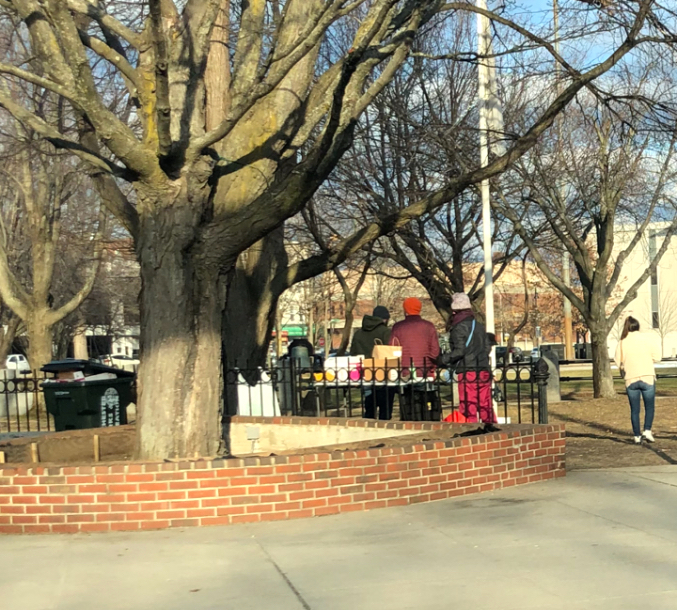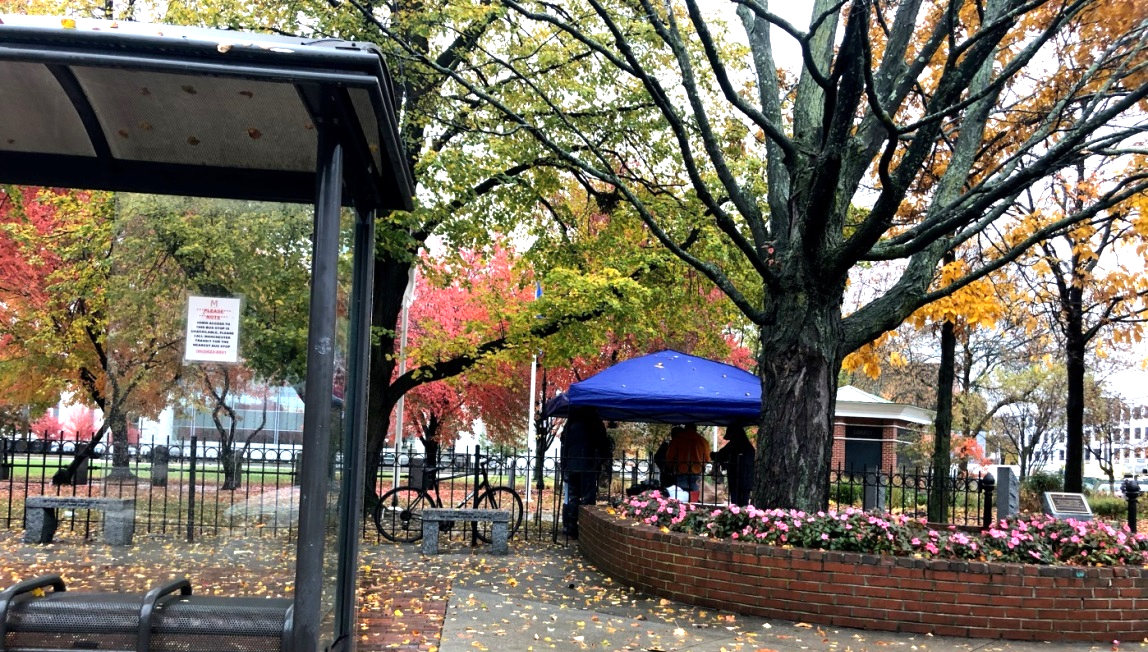
MANCHESTER, NH – Manchester officials are planning a summit with the non-profit that runs the local needle exchange before the end of the year, in an attempt to resolve its differences, align their quality standards and improve coordination, even as the city works to set up its own syringe services program with a different non-profit.
Manchester Health Department Director Anna Thomas said the department is currently working with drug prevention non-profit Makin’ It Happen using grant funds from the Governor’s Office for Emergency Relief and Recovery Fund (GOFERR) to come up with a city-wide blueprint for a syringe services program.
“We intend to publish a final document with recommendations toward improvement by the end of this year. Our goal will be to build a comprehensive model from these recommendations for those struggling with addiction with a pathway to substance use treatment, medical care, mental health services and other support services,” Thomas said in an email.
The hope is to have a single overarching program, rather than two competing efforts, according to Mayor Joyce Craig.
“We all have to be working together on that,” Craig told Manchester Ink Link Tuesday.
But whether the city manages to change how the current program operates, or if the city ends up running its own parallel program, “all of the above” is up for discussion, according to Thomas.

For over a year, Manchester city government has been waging a largely silent war against the New Hampshire Harm Reduction Coalition (NHHRC), another non-profit that’s been distributing syringes to addicts and collecting used syringes. But so far the city’s efforts to encourage more coordination and, more recently, to shut down the needle exchange have been unsuccessful.
Volunteers of the organization’s Manchester branch, known as the Queen City Exchange say they’re providing a critical service that keeps people with substance use disorder safe from infection, and which safely disposes of used needles.
A regular weekend gathering of people with substance use issues on Veterans Park, open buckets of used needles, a perceived lack of outreach and referrals to prevention and treatment resources, rumors of barrels of used needles in a volunteer’s basement and a lack of partnership with the city are among some of the concerns the mayor’s office and city health department have expressed in letters to state officials since the start of the year.
“There is not a partnership with the local community. And that is one of my biggest concerns. In addition, the program that currently exists in the city is not evidence-based,” said Craig.
Queen City Exchange volunteer Andrew Warner said the city is trying to put an end to an important program that helps people, and which is provided with local buy-in elsewhere in the state and in neighboring states.
“They’re actively preventing us from helping IV addicts in Manchester,” Warner said. “The department of health is actively fighting this volunteer group that goes out on Sundays … offering a service that should be available to people.”
Craig said the program currently being run under the auspices of the NHHRC is giving out free syringes but not tying it to education and resources.
“I have a problem with that,” she said.
Both Craig and Thomas say they are not against having a syringe program, they just don’t believe the current one is properly run.
“I just want to make clear that I am supportive of syringe services. Evidence-based syringe services,” Craig said.

Since city officials, including Craig, Thomas, former Police Chief Carl Copano, Fire Chief Dan Goonan and others met with representatives from NHHRC in April 2019, in an attempt to bring the needle exchange into the fold and start partnering with the city, relations have only gotten worse, according to Craig.
A few days after the meeting, NHHRC chairperson Kerry Nolte wrote to the city officials promising to not promote regular outreach events, and to stay “low key” by responding to demand on an ad hoc basis.
As far as the city is concerned, the Coalition failed to live up to that promise, as volunteers can be seen nearly every Sunday at Veteran’s Park operating its exchange program. And, as Thomas noted in a February letter to Patrick Tufts, the chairman of the Governor’s Commission on Alcohol and other Drugs, state data shows the city program provided nearly 8,000 needles and made only 10 referrals for drug treatment or disease testing over a two-year period.
Thomas’s letter reiterated in writing many of the concerns she brought before the commission in January, primarily that the Queen City Exchange program is not following state laws requiring that it work collaboratively with local providers to not only provide clean syringes and dispose of dirty needles, but to establish a pathway to recovery as part of the program.
Despite these concerns, the non-profit received state aid in the amount of $770,000 for two years, approved by the Executive Council in August, to help fund care coordination, linkages to the Doorways program and case management for not only Manchester, but also Nashua, Keene, Concord and the Seacoast region.

Though this money is not used directly for new syringes provided by NHHRC, Craig and Thomas were outraged that the state wouldn’t communicate with them about this first, and formally asked the state not to disperse the funds to Manchester.
State Department of Health and Human Services Commissioner Lori Shibinette said in a letter that local stakeholder input is not allowed during the contracting phase of any state contract, and called on Manchester officials to support the program.
“Other communities that have worked collaboratively with the Harm Reduction Coalition have had very positive experiences,” Shibinette said. “Without that partnership, Queen City Exchange can continue to offer their current programs with no contractual obligations or funding to provide those services that are so desperately needed.”
Shibinette said the new funding would strengthen one of the areas the city found lacking: care coordination.
At the center of the conflict is a lack of trust between the city and the Queen City Exchange.
In a letter to the associate commissioner of DHHS, Thomas questions what training and competency the volunteers at the needle exchange have.
Warner said he and other volunteers are outreach coordinators and work with mental health or treatment providers in their day jobs.
“That’s what literally half of us do for a living,” Warner said.
Warner said he believes the city doesn’t want to provide syringe services because it attracts addicts from out of town, though Craig said this is not true.
Thomas recounts a rumor in her letter to Tufts that a needle exchange volunteer told Chief Goonan in Aug. 2019 that they never dispose of the used needles and that a volunteer has stored thousands of them in a dozen five-gallon drums in their basement.
No one from the board of NHHRC would speak for attribution for this story, however in a statement they said that when the program began they had not immediately identified an entity to dispose of its used needles, but said they were safely sealed and that issue was addressed a year ago.
“There were times volunteers would temporarily store sealed biohazard containers until they could be delivered to our disposal site,” the statement said.
Today, containers with used syringes are sent to a secure warehouse in Concord and picked up by biohazard disposal company Stericycle. The board statement said the fact that needles may be visible during exchange events does not indicate unsafe practices.
“There is an important distinction between ‘best practices’ and ‘scope of services.’ QCE employs best practices in the current scope of service which is safely removing used syringes from circulation and providing sterile syringes to people who need them,” the NHHRC board said.
Thomas is skeptical that the program is taking enough used syringes out of circulation. In late October, the department found over 100 used syringes in the woodline of Derryfield Park, near two schools. She said it was the most needles ever collected from one site.
In a Nov. 2 email to Shibinette, Craig lamented the amount of waste found at the now-cleared homeless camp by the Hillsborough County Superior Court.
“There are needles, condoms and narcan littered all over state-owned property at the Hillsborough County Courthouse, as well as our City, as a result of the free Sunday giveaways in Veterans Park that the state has funded against the City’s wishes,” Craig said in the email.
But the Queen City Exchange reduces the amount of publicly discarded syringes, NHHRC insists, saying that “it has always been common for people to misattribute (needle exchanges) with public discard.”
No one from the NHHRC board contacted for this story was unable to untangle exactly how much of the state’s funding is being directed to Manchester, since it uses a “braided” model that serves multiple communities, with fluctuating expenses, but they said more funding could potentially make the program less visible.
“Additional funding to this braided model could enable services to be provided from a van or bricks and mortar location stabilizing the delivery of critical harm reduction services,” they said in a statement.
Meanwhile, demand for Queen City Exchange services have skyrocketed. When Warner started volunteering at the program in the summer of 2019, he said he used to see 50 to 75 people in a two-hour period.
“Now we see from 180 to 200 every Sunday,” Warner said.







